In This Episode << SLIDE LEFT TO SEE ADDITIONAL SEGMENTS
Abstinence-Only Sex Education
BOB ABERNETHY, anchor: One of the most difficult religious and ethical questions facing many communities — and often tearing them apart — is how the public schools should educate children about sex.
Some want a comprehensive approach that recommends abstinence but also covers birth control and disease prevention. Others, especially religious conservatives, want abstinence education only. But some say comprehensive sex ed encourages sexual activity, and others feel the abstinence-only approach results in more pregnancy and disease. Lucky Severson examined the dilemma in Lubbock, Texas.
LUCKY SEVERSON: There is one thing all sides of the heated debate over sex education for kids can agree on — the need.
ADAM HERNANDEZ (Student): I think it is hard being our age and being in high school is hard, just not having sex.
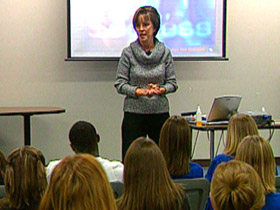
SEVERSON: Every day, the battle over how best to educate kids about sex gets more polarized. This is Marilyn Morris. She runs the country’s largest abstinence-only sex education program, called Aim for Success. Today she’s the invited speaker at the Vines High School Abstinence Club near Dallas.
MARILYN MORRIS (Aim for Success) (Talking to Students): Folks, good news: this abstinence thing is huge. It’s moving all across America.
SEVERSON: Aim represents a rapidly growing movement, strongly promoted by President Bush, that the only solution to teen pregnancy and sexually transmitted diseases, or STDs, is total abstinence until marriage. No condoms, no sex.
Ms. MORRIS: I think that you have to understand that what we have been doing in America for all 35 years is encouraging comprehensive sex education. And what that did is encourage sexual activity.
SEVERSON: Vilka Scott Kitching takes an opposite view. She is a disease intervention specialist at the Lubbock, Texas health department, and says she sees too many teens with STDs.
VILKA SCOTT KITCHING (Disease Intervention Specialist, Lubbock Health Department): Time and time again we have people in our clinic who come totally unprepared to face a disease of that nature because nobody had spoken to them about the consequences of starting to have sex without any protection.
Ms. MORRIS (Talking to Students): Did you know that every single day in our country, 2,305 teenaged girls get pregnant?
SEVERSON: The good news, according to Marilyn Morris, is that the number of teen pregnancies has been coming down — still, over 800,000 teens get pregnant each year. Morris tells the kids she was one of those statistics, and that’s what motivated her to push abstinence only.
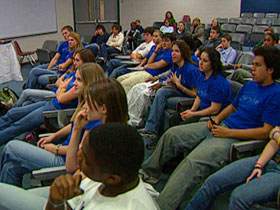
Ms. MORRIS (Talking to Students): If you’re the one it’s happening to, you’d find out like I did, it is a big deal. In fact, it was more like a living nightmare. Here I was, 17. I had all kinds of dreams and goals ahead of me.
SEVERSON: Her message is that abstinence only allows kids to fulfill their dreams without the nightmare of unwanted pregnancy or diseases such as chlamydia.
Ms. MORRIS (Talking to Students): Ready? (sprays card held by student) You don’t have it.
SEVERSON: She dwells on the dangerous and deadly diseases that often go undetected for years.
Ms. MORRIS (Talking to Students): Are you ready? Here we go, 10th-grade guys (sprays card and it turns red).
ED AINSWORTH (Whiteheart Communications) (Talking to Students): How many of you have watched the television show FRIENDS? Raise your hand.
SEVERSON: Ed Ainsworth is another abstinence-only advocate who lecturers nationwide. These are sixth graders at the Ropesville School near Lubbock, Texas.
First, he ridicules the “sex is okay” culture that surrounds today’s teenagers, including prime-time TV programs like the sitcom, FRIENDS.
Mr. AINSWORTH (Talking to Students): Is that TV show about sex? It is about all of them having as much sex as they can with whoever they want to, right?
SEVERSON: He says the first time he had sex was the day he married Connie.
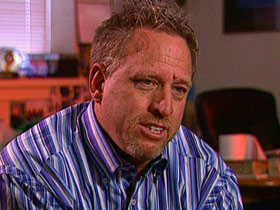
Mr. AINSWORTH (Talking to Students): If you have sex outside marriage, it will cost you. It may cost you physically with a pregnancy or a disease. It may cost you mentally and emotionally with your reputation. How you feel about yourself. It may cost you spiritually, and I know with my boundaries I can’t talk to you about the spiritual consequences because we are in school. But believe me, young people, there are tons of spiritual consequences.
SEVERSON: Ropesville, like hundreds of school districts across the country, receives federal funding for programs that are almost exclusively abstinence only. Over the past 5 years, the government has spent more than $800 million on such programs. Schools like Ropesville provide no comprehensive sex education, but invite abstinence-only lecturers like Ainsworth to fill the gap.
Mr. AINSWORTH (Talking to Students): I got up this morning and said, “Lord, all I want is one teenager. All I want is one. Help me change one life and I will be a success today.”
SEVERSON: Ainsworth is legally prohibited from mixing religion with his presentations, but like many on the lecture circuit, Ainsworth comes from an evangelical background and says if the kids are like him and have a close relationship with Christ, they’ll stay sexually pure. He has also been a youth pastor for 27 years.
Mr. AINSWORTH (Speaking in Church): It is the will of God that you abstain from sexual impurity until you are married.
They’ve heard me at school, and then they hear me in a church. They tell me in a church it makes way more, much more sense. Why? Because there’s the power behind the message.
SEVERSON: The message, he says, is one reason fewer teens are giving birth in Lubbock, although teen pregnancy started inching down nationwide before abstinence-only education became popular. Meanwhile, Lubbock has experienced an epidemic of gonorrhea and chlamydia. Lubbock disease specialist Vilka Scott Kitching wouldn’t allow her 12-year-old daughter to attend an Ainsworth class because she says she has seen too many patients who had.
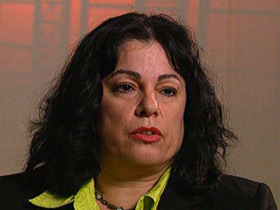
Ms. SCOTT KITCHING: They tell us, “Well, this guy came to school and he said condoms don’t work, so, I didn’t use one. But I was going to have sex anyway, so here I am with one, two, three STDs.” But young people eventually do have sex. I would rather they had more comprehensive information about the subject than just say no to it.
SEVERSON: In 2002, some Lubbock high school students grew so alarmed at the surge of sexually transmitted diseases, they requested more sex education in schools — more comprehensive sex education. They were refused.
Erica Vales attended one of Ainsworth’s sessions.
ERICA VALES (Student): Like, he didn’t say anything about birth control. He just said the Bible says abstinence is better until marriage — that was in the assembly we took during school. He told us that.
Mr. AINSWORTH: I am not going to promote the use of condoms and those kinds of things, knowing that a student can listen to me and walk out of here and, albeit their choice, go have sex with someone who has AIDS, and use a condom, and die.
DARLENE WORKMAN (School Nurse, Vines High): I spent eight years handing out the protection. And you know what? They’re too young to be mature enough to use it.
SEVERSON: Darlene Workman is the school nurse at Vines High. She came here after quitting her job as a director of a family planning clinic in Michigan, where they taught comprehensive sex education and handed out condoms.
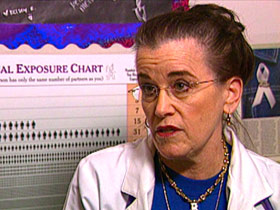
Ms. WORKMAN: One of my students came up to me and said, “Well, Ms. Workman, if you’re handing these out, that means you must think it’s okay for us to participate.” And I never in the world thought it was okay. So what I did was quit.
SEVERSON: One of the first things she did here was start an abstinence-only club. They are becoming increasingly prevalent throughout the country. This is David.
DAVID: When condoms are presented as a way to have safe sex and avoid the ramifications, they do encourage teens to have sex.
Ms. VALES: Well, it will encourage some people, but it will prevent a lot of pregnancies. Or even just telling girls about birth control. Because nobody ever talks about birth control.
SEVERSON: A recent congressional study cast some doubt on the effectiveness of federally funded abstinence-only programs. The study found scientific inaccuracies in many of the textbooks, which, for instance, quote a much higher failure rate of condoms than is the case.
One textbook states that the HIV virus can be transmitted through tears, sweat, and saliva. Not true. Marilyn Morris says the study was biased and politically motivated.
Ms. MORRIS: Because I think they are people who are very, maybe, antireligious. And they looked at the abstinence message as a religious message. But for us, at Aim for Success, it is a health issue.
SEVERSON: Another study found that 88 percent of kids who had taken an abstinence pledge admitted having sexual intercourse before marriage, and that teens who contracted STDs were less likely to realize they had a disease.
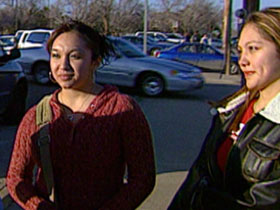
Ms. SCOTT KITCHING: The more knowledge you have on the subject, the more equipped you are to handle that subject. If you look at studies in other countries, in Europe where sex education is comprehensive, you can see clearly that their rates are lower than ours.
SEVERSON: And in Texas, the STD rates keep rising steadily.
Ms. WORKMAN: That says we have a lot of work to do. It doesn’t say that we should hand out condoms, to me, at all. I think the churches need to get together. I think the community needs to get together. I think the parents need to take up to the plate — stand up to the plate and take some action here.
SEVERSON: For some kids, the debate and the dilemma come down to this. Can moral arguments persuade them to avoid sex until marriage, or if they’re taught about condoms and safe sex, does that encourage them to have sex? Or is the answer somewhere in the middle?
For RELIGION & ETHICS NEWSWEEKLY, I’m Lucky Severson in Ropesville, Texas.
ABERNETHY: Although major studies are in progress, there are as yet no generally accepted data on the consequences of comprehensive versus abstinence-only sex education.

